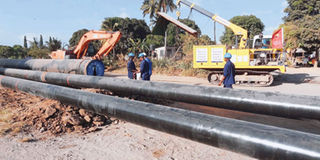Oil, gas players eye deal with government

Workers laying natural gas pipelines somewhere in Tanzania. photo | FILE
Dar es Salaam. The year-2019 has gone - and now stakeholders in the oil and gas sector harbour hopes that they will be able to make concrete progress in seeking to agree on key terms in negotiations with the Tanzania government for a Host Government Agreement (HGA) for the development of Liquefied Natural Gas (LNG) plant in the country.
They express optimism that 2020 will be the year when they will gather the momentum needed to accomplish what they were unable to accomplish in 2019 - and even earlier.
According to reports, early last year, oil and gas multinationals restarted negotiations with the government on the HGA that had stalled since 2017 due to technicalities.
This is because the international oil companies (IOCs) could not agree on modalities altogether - and, consequently, the negotiations had to be halted. Then it was collectively agreed that they do the negotiating separately.
After the delay, negotiations started in April last year. But they yet again encountered a hitch that caused them to be shelved once more. This was if only because the Production Sharing Agreements (PSAs) arrangements are currently being reviewed by the government.
Reports have it that the government is seeking to scrap sections in the PSAs that it see are tilted against the country - thereby denying itrevenues and other benefits.
The Attorney General is in talks with the investors to review outlined areas that need to be changed in order to come up with a win-win situation.
The Tanzania Petroleum Development Corporation (TPDC) managing director, Mr James Mataragio, said negotiations on HGA key terms are still awaiting the PSA review.
However, he said they expect to resume negotiations and other issues, including on land on which the proiposed LNG is to be located.
“As soon as the pending issues are finalised, we expect to resume negotiations,” he said.
n August 2019 before the PSA issue had arisen, Mr Mataragio was optimistic that the negotiations would be completed last September and they would move to another level, i.e. Preparation for Front End Engineering Design (pre-FEED).
He had said the HGA negotiations were on schedule and the next stage would be the pre-FEED.
The pre-FEED includes all that would be involved in the construction of the LNG project. Meanwhile, the Shell Exploration and Production (T) managing director, Frederik Grootendorst, told The Citizen on Monday that their aspirations remain the same: to commercialize deep-sea gas reserves and establish a legal and commercial framework that would benefit Tanzania, its people - and investors.
Partners in the project include Shell Tanzania, with its partners Ophir Energy and Pavilion Energy.
He said the win-win outcome will not only transform Tanzania’s economy, but will also cement its position as a key energy player while simultaneously supporting the industrialisation agenda of the government in terms of the National Development Vision-2025.
“We expect 2020 to be a very important and critical period for the oil and gas sector. Shell and our partners remain committed in prodriving the Tanzania domestic gas and LNG project forward as quickly as possible,” he said.
According to him, the sector had a good start last year - what with the commencement of negotiations with the government on the HGA key terms, and hopes that they can collectively ramp up that same energy and momentum this year.
For their part, Equinor -Block 2 operator together with partner ExxonMobil - is looking forward to concluding the HGA negotiations with the government in 2020.
Equinor’s country manager for Tanzania, Mette Halvorsen Ottøy, said conclusion of the discussions would enable the project to move to the next stage - and contribute to the Tanzanian dream of a semi-industrialised, middle-income economy by Year-2025 as earlier encisaged.


